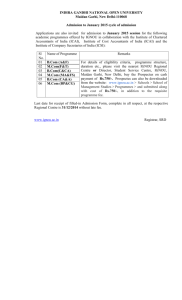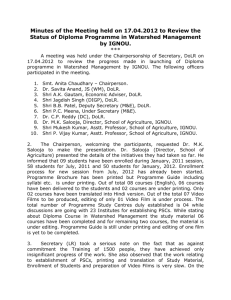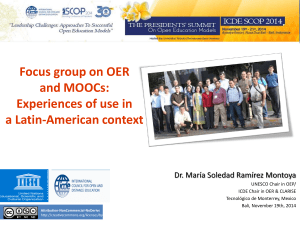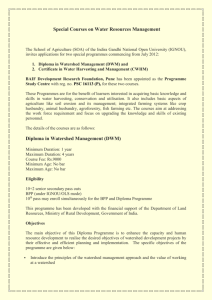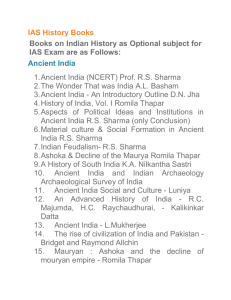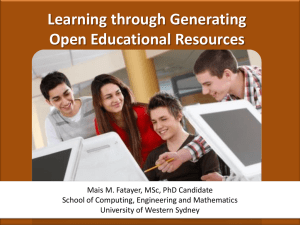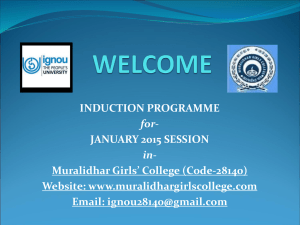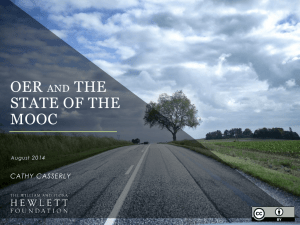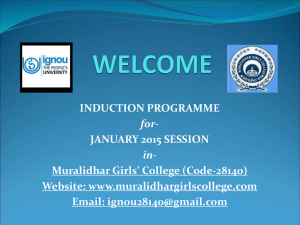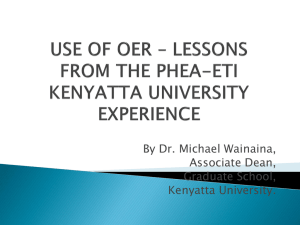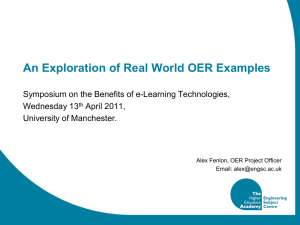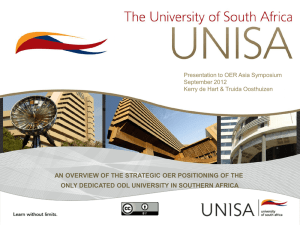Click to add title
advertisement
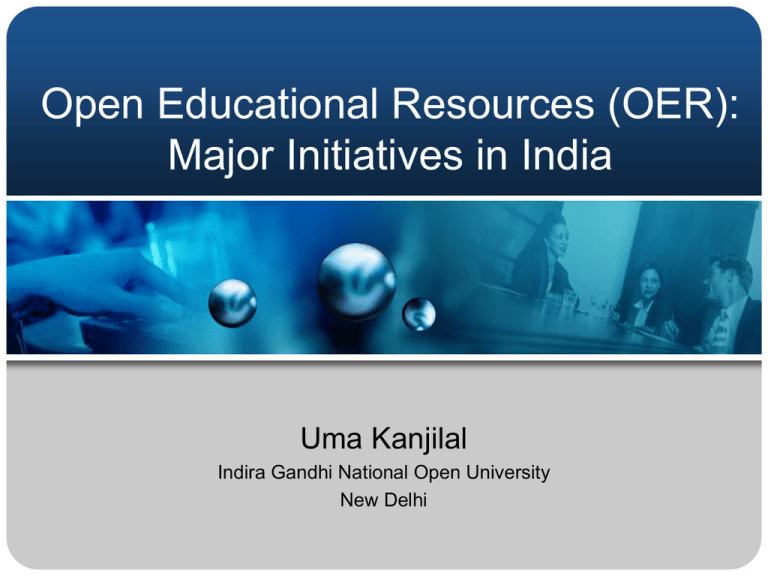
Open Educational Resources (OER): Major Initiatives in India Uma Kanjilal Indira Gandhi National Open University New Delhi Definition of OER • “Digitised material offered freely and openly to educate students and independent learners to use and reuse for teaching, learning and research”. Term coined in 2002 in UNESCO Forum on impact of Open Courseware for Higher Education in Developing countries. Comparing related terms OA sharing content, usually of scholarly nature, without a requirement for the use of an Open license OER educational content that is shared under an Open license OCW sharing open content that is developed specifically to instruct a course E-learning electronic instructional resources that are not necessarily Openly licensed Open Movements 1. Open Source 2. Open Content 3. Open Educational Resources 4. Open Text Books 5. Open Degrees 6. Open Knowledge Open Collections and Repositories • • • • • • • • • • Wikipedia http://www.wikipedia.org/ Wikiversity http://wikiversity.org/ Connexions (Rice University) http://cnx.org/ MERLOT http://www.merlot.org/merlot/index.htm Knowledge Hub http://khub.itesm.mx/ Flicker CC http://www.flickr.com/creativecommons/ UNESCO http://portal.unesco.org/ Internet Archive http://www.archive.org/index.php I Tunes http://www.apple.com/itunes/download/ You Tube http://www.youtube.com/ Major University based OER Collections • MIT http://ocw.mit.edu/ • Open University http://openlearn.open.ac.uk/ • Open Learning Initiative (OLI)- CMU http://oli.web.cmu.edu/openlearning/ • eGyanKosh- IGNOU http://www.egyankosh.ac.in • United Nations University http://www.unu.edu/ Major Learning Object Repository Initiatives • MERLOT (Multimedia Educational Resource for Learning and Online Teaching) • CAREO (Campus Alberta Repository of Educational Objects) • Connexions • NPTEL (126 web courses and 115 video courses) • NCERT Text Books • CEC LOR repository April 8, 2015 Uma Kanjilal, IGNOU 7 Barriers to OER Movement • intellectual property rights and digital rights management- Creative Commons license • Discoverability- OERCommons, Creative Commons search, and OCWC Course Finder April 8, 2015 Uma Kanjilal, IGNOU 8 National Knowledge Commission (NKC) Recommendations • Use of globally available Open Educational Resources (OER) and Open Access (OA) as a means of radically increasing the widespread availability of high-quality educational resources • Setting up of a National Education Foundation to develop web based common open resources OA, Open Source and OER: Status in India • Active player in the open source software movement, and OA movement – • Increasing availability of OA electronic journals, OA institutional repositories and open source software-based repositories such as DSpace and EPrints. • scientific journals accessible as OA • Indian Institute of Science of Bangalore, along with Carnegie Mellon University, along with 21 Indian institutions have digitised more than 450,000 books, 220,000 of which are now web accessible • Open Source tools in education- Brihaspati and Vmukti • Major initiatives like NMEICT and NPTEL to develop open educational content National Mission on Education through Information and Communication Technology (NME-ICT) • The Mission approved by the Government of India on the 2nd January, 2009. • NMEICT launched on 3rd February, 2009. • It is a Centrally sponsored scheme which entails 75% contribution from the Centre and 25% from States/Institutions for connectivity. In the case of NER, the ratio is 90:10. • 100% contribution from Centre for content generation. • 50% contribution from Centre for devices. Broad Objectives • To use ICT in enhancing teaching and learning. • To reach hitherto deprived sections and rural / under-developed areas. • To help in raising the GER in higher education by 5% in the current Five Year Plan. Major ongoing projects under the Mission • National Programme of Technology Enhanced Learning (NPTEL) • Virtual Labs • Educational Resource Planning (ERP) • Mobile e-Learning Terminals (MeLT) • E-books and e-journals (N-LIST) • Haptic devices Sakshat Portal Objectives of the Sakshat Portal Sakshat: An Official Website of NME-ICT • Provide updates on the National Mission on Education through ICT (NMEICT) • Keep record of meetings of the different Committees of the Mission • Platform for project uploading, reviewing and monitoring • Provide one stop access to all e-content developed under the Mission as well as open access and licensed e-journals and e-books • Manage scholarships of the MHRD • Provide virtual learning platform for the learners with built in interactivity Sakshat Modules • • • • • • Project Management System Scholarship Management System Learning Resource Repository E-book and e-journal portal Virtual Classroom Live webcasting and video on demand Four Quadrant Approach 1st Quad 2nd Quad e-Content PDF / e-Books / illustration , video demonstrations / document arising & Interactive simulations wherever required e-Tutorial Content Video + Audio in an organised form, Animation, Simulations, Virtual Labs 4th Quad 3rd Quad Web Resources Related Links, Wikipedia Development of Course, Open Content in Internet, Case Studies, Anecdotal information, Historical development of the subject, Articles Self Assessment MCQ, Problems, Quizzes, Assignments & solutions, Online feedback through discussion forums & setting up the FAQ , General Misconceptions Virtual Class April 8, 2015 Uma Kanjilal, IGNOU 21 National Programme on Technology Enhanced Learning (NPTEL) • • • • • http://www.nptel.iitm.ac.in, http://youtube.com/nptelhrd/ open courseware initiative by seven Indian Institutes of Technology (IITs) and the Indian Institute of Science (IISc) objective of NPTEL program is to enhance the quality of engineering education in the country by developing curriculum based video and web courses supplementary content for 129 web courses in engineering/science and humanities 110 courses have been developed in video format, with each course comprising of approximately 40 or more one-hour lectures Proposed for Virtual Technical University eGyanKosh (e=electronic, gyan= knowledge, kosh= repository) of IGNOU http://www.egyankosh.ac.in • Collection of more than 30000 covering 95% of the IGNOU SIMs and 1600 videos • Webcasting of Broadcast channels • Wiki for Collaborative content generation FlexiLearn Main Page April 8, 2015 Uma Kanjilal, IGNOU 24 A Move Towards Flexible Learning Environment • • • • • Course wise registration and assessment Modular approach to earn course credits for obtaining a diploma or degree Academic Advisors for each course E-portfolio for a formal record of all formal and informal studies carried out by the registered learner On demand assessment LOR Consortium for Educational Communication (CEC) • • • • www.cec-lor.edu.in www.cec-lor.edu.in/search.asp www.cec-lor.edu.in/dvr/ CEC is an inter-university centre on electronic media underthe University Grants Commission (UGC) CEC in coordination with its 17 Educational Multimedia Research Centres produces television programmes in various subject categories in English, Hindi and regional languages A/V programmes are syllabus-based topics taught in schools, polytechnics, colleges and universities CEC Learning Object Repository (LOR) and the Digital Video Repository (DVR) provides worldwide access to these qualitative learning resources NCERT Online Textbooks • • • • http://www.ncert.nic.in/textbooks/ NCERT is an apex resource organization set up by the Government of India to assist and advise the Central and State Governments on academic matters related to school level education NCERT publishes school textbooks, mainly in English, Hindi and Urdu. School textbooks are now freely available on the Internet for students and teachers through its website Most of the textbooks available in this portal are new editions, based on the National Curriculum Framework 2005. Other Projects • Ekalavya, launched by IIT, Bombay an open education initiative for content development in various Indian languages. Open Source Educational Resources Animation Repository (OSCAR) that provides web-based interactive animations for teachingis part of the project. • Project on curriculum based content to address the information needs of the undergraduate students of science through National Science Digital Library (NSDL) initiative under the aegis of Council of Scientific and Industrial Research (CSIR). Issues and Challenges • Most of them in nascent stage of development • Mostly not following any standards, • Based on Web 1.0 tools, migration towards Web 2.0 necessary • None of them available under Creative Commons Licences • How to enhance and relate to teaching learning process? • How to cater to heterogeneous group needs? Thank You ukanjilal@ignou.ac.in
